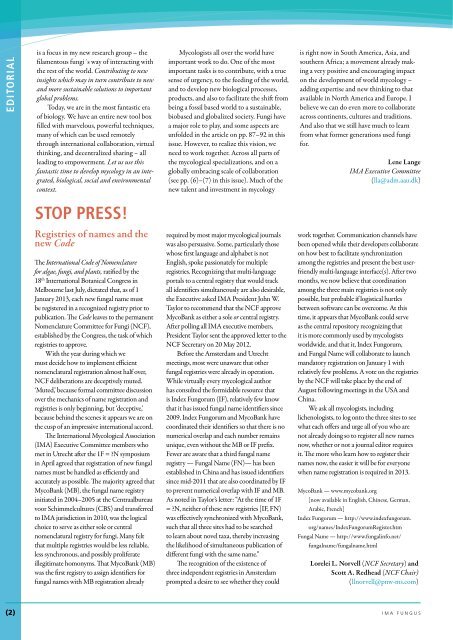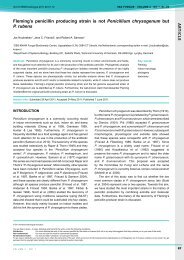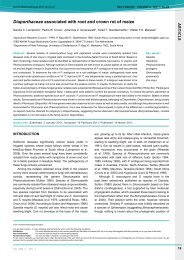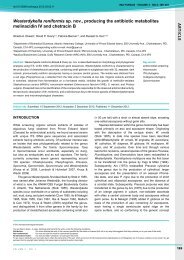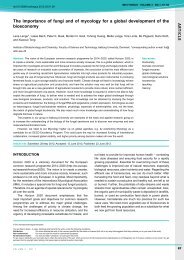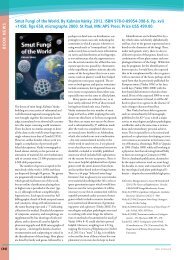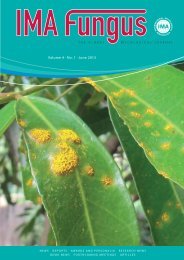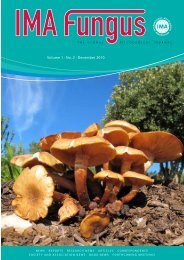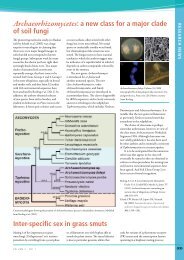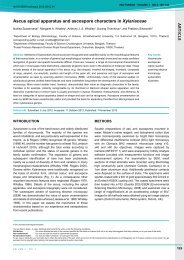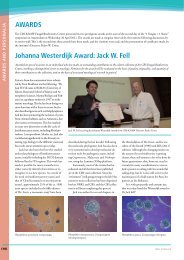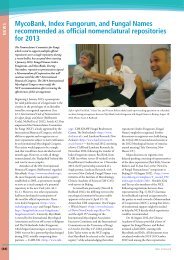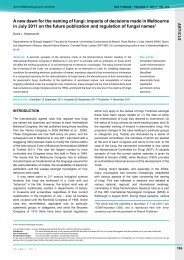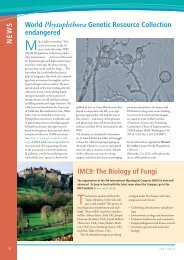complete issue - IMA Fungus
complete issue - IMA Fungus
complete issue - IMA Fungus
Create successful ePaper yourself
Turn your PDF publications into a flip-book with our unique Google optimized e-Paper software.
EDITORIAL<br />
is a focus in my new research group – the<br />
filamentous fungi´s way of interacting with<br />
the rest of the world. Contributing to new<br />
insights which may in turn contribute to new<br />
and more sustainable solutions to important<br />
global problems.<br />
Today, we are in the most fantastic era<br />
of biology. We have an entire new tool box<br />
filled with marvelous, powerful techniques,<br />
many of which can be used remotely<br />
through international collaboration, virtual<br />
thinking, and decentralized sharing – all<br />
leading to empowerment. Let us use this<br />
fantastic time to develop mycology in an integrated,<br />
biological, social and environmental<br />
context.<br />
sTOP PREss!<br />
Registries of names and the<br />
new Code<br />
The International Code of Nomenclature<br />
for algae, fungi, and plants, ratified by the<br />
18 th International Botanical Congress in<br />
Melbourne last July, dictated that, as of 1<br />
January 2013, each new fungal name must<br />
be registered in a recognized registry prior to<br />
publication. The Code leaves to the permanent<br />
Nomenclature Committee for Fungi (NCF),<br />
established by the Congress, the task of which<br />
registries to approve.<br />
With the year during which we<br />
must decide how to implement efficient<br />
nomenclatural registration almost half over,<br />
NCF deliberations are deceptively muted.<br />
‘Muted,’ because formal committee discussion<br />
over the mechanics of name registration and<br />
registries is only beginning, but ‘deceptive,’<br />
because behind the scenes it appears we are on<br />
the cusp of an impressive international accord.<br />
The International Mycological Association<br />
(<strong>IMA</strong>) Executive Committee members who<br />
met in Utrecht after the 1F = ?N symposium<br />
in April agreed that registration of new fungal<br />
names must be handled as efficiently and<br />
accurately as possible. The majority agreed that<br />
MycoBank (MB), the fungal name registry<br />
initiated in 2004–2005 at the Centraalbureau<br />
voor Schimmelcultures (CBS) and transferred<br />
to <strong>IMA</strong> jurisdiction in 2010, was the logical<br />
choice to serve as either sole or central<br />
nomenclatural registry for fungi. Many felt<br />
that multiple registries would be less reliable,<br />
less synchronous, and possibly proliferate<br />
illegitimate homonyms. That MycoBank (MB)<br />
was the first registry to assign identifiers for<br />
fungal names with MB registration already<br />
Mycologists all over the world have<br />
important work to do. One of the most<br />
important tasks is to contribute, with a true<br />
sense of urgency, to the feeding of the world,<br />
and to develop new biological processes,<br />
products, and also to facilitate the shift from<br />
being a fossil based world to a sustainable,<br />
biobased and globalized society. Fungi have<br />
a major role to play, and some aspects are<br />
unfolded in the article on pp. 87–92 in this<br />
<strong>issue</strong>. However, to realize this vision, we<br />
need to work together. Across all parts of<br />
the mycological specializations, and on a<br />
globally embracing scale of collaboration<br />
(see pp. (6)–(7) in this <strong>issue</strong>). Much of the<br />
new talent and investment in mycology<br />
required by most major mycological journals<br />
was also persuasive. Some, particularly those<br />
whose first language and alphabet is not<br />
English, spoke passionately for multiple<br />
registries. Recognizing that multi-language<br />
portals to a central registry that would track<br />
all identifiers simultaneously are also desirable,<br />
the Executive asked <strong>IMA</strong> President John W.<br />
Taylor to recommend that the NCF approve<br />
MycoBank as either a sole or central registry.<br />
After polling all <strong>IMA</strong> executive members,<br />
President Taylor sent the approved letter to the<br />
NCF Secretary on 20 May 2012.<br />
Before the Amsterdam and Utrecht<br />
meetings, most were unaware that other<br />
fungal registries were already in operation.<br />
While virtually every mycological author<br />
has consulted the formidable resource that<br />
is Index Fungorum (IF), relatively few know<br />
that it has <strong>issue</strong>d fungal name identifiers since<br />
2009. Index Fungorum and MycoBank have<br />
coordinated their identifiers so that there is no<br />
numerical overlap and each number remains<br />
unique, even without the MB or IF prefix.<br />
Fewer are aware that a third fungal name<br />
registry — Fungal Name (FN)— has been<br />
established in China and has <strong>issue</strong>d identifiers<br />
since mid-2011 that are also coordinated by IF<br />
to prevent numerical overlap with IF and MB.<br />
As noted in Taylor’s letter: “At the time of 1F<br />
= ?N, neither of these new registries [IF, FN)<br />
was effectively synchronized with MycoBank,<br />
such that all three sites had to be searched<br />
to learn about novel taxa, thereby increasing<br />
the likelihood of simultaneous publication of<br />
different fungi with the same name.”<br />
The recognition of the existence of<br />
three independent registries in Amsterdam<br />
prompted a desire to see whether they could<br />
is right now in South America, Asia, and<br />
southern Africa; a movement already making<br />
a very positive and encouraging impact<br />
on the development of world mycology –<br />
adding expertise and new thinking to that<br />
available in North America and Europe. I<br />
believe we can do even more to collaborate<br />
across continents, cultures and traditions.<br />
And also that we still have much to learn<br />
from what former generations used fungi<br />
for.<br />
Lene Lange<br />
<strong>IMA</strong> Executive Committee<br />
(lla@adm.aau.dk)<br />
work together. Communication channels have<br />
been opened while their developers collaborate<br />
on how best to facilitate synchronization<br />
among the registries and present the best userfriendly<br />
multi-language interface(s). After two<br />
months, we now believe that coordination<br />
among the three main registries is not only<br />
possible, but probable if logistical hurtles<br />
between software can be overcome. At this<br />
time, it appears that MycoBank could serve<br />
as the central repository recognizing that<br />
it is more commonly used by mycologists<br />
worldwide, and that it, Index Fungorum,<br />
and Fungal Name will collaborate to launch<br />
mandatory registration on January 1 with<br />
relatively few problems. A vote on the registries<br />
by the NCF will take place by the end of<br />
August following meetings in the USA and<br />
China.<br />
We ask all mycologists, including<br />
lichenologists, to log onto the three sites to see<br />
what each offers and urge all of you who are<br />
not already doing so to register all new names<br />
now, whether or not a journal editor requires<br />
it. The more who learn how to register their<br />
names now, the easier it will be for everyone<br />
when name registration is required in 2013.<br />
MycoBank — www.mycobank.org<br />
[now available in English, Chinese, German,<br />
Arabic, French]<br />
Index Fungorum — http://www.indexfungorum.<br />
org/names/IndexFungorumRegister.htm<br />
Fungal Name — http://www.fungalinfo.net/<br />
fungalname/fungalname.html<br />
Lorelei L. Norvell (NCF Secretary) and<br />
Scott A. Redhead (NCF Chair)<br />
(llnorvell@pnw-ms.com)<br />
(2) ima funGuS


